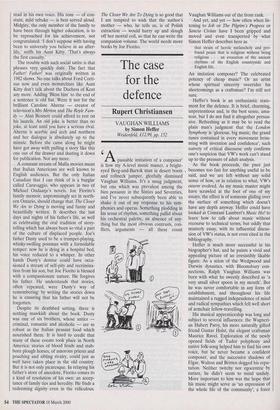The case for the defence
Rupert Christiansen
VAUGHAN WILLIAMS by Simon Hoffer Weidenfeld, £12.99, pp. 152 C Apassable imitation of a composer' is how my A-level music master, a bright- eyed Berg-and-Bartok man in desert boots and rollneck jumper, gleefully dismissed Vaughan Williams. It's a smug judgment, but one which was prevalent among the bien pensants in the Sixties and Seventies, and I've never subsequently been able to shake it out of my response to his sym- phonies and operas. Something plodding in his sense of rhythm, something pallid about his orchestral palette, an absence of any- thing but the most obvious contrasts, con- flicts, arguments — all these count Vaughan Williams out of the front rank. And yet, and yet — how often when lis- tening to Job or The Pilgrim's Progress or Sancta Civitas have I been gripped and moved and even transported by what Simon Heifer describes here as that strain of heroic melancholy and pro- found peace that is religiose without being religious . . . an evocation of the ancient rhythms of the English countryside and English life.
An imitation composer? The celebrated potency of cheap music? Or an artist whose spiritual sincerity overrides his shortcomings as a craftsman? I'm still not sure.
Heffer's book is an enthusiastic state- ment for the defence. It is brief, charming, unpretentious and, in the best sense, ama- teur, but I do not find it altogether persua- sive. Refreshing as it may be to read the plain man's judgment that the London Symphony is 'glorious, big music, the grand tunes contained in every movement brim- ming with invention and confidence', such naivety of critical discourse only confirms one's suspicion that VW's work can't stand up to the pressure of adult analysis.
As the book proceeds, the pace just becomes too fast for anything useful to be said, and we are left without any solid sense of how, or in relation to what, VW's oeuvre evolved. As my music master might have scrawled at the foot of one of my essays, the effect is of someone gliding over the surface of something which doesn't have any depth anyway. Heifer could have looked at Constant Lambert's Music Ho! to learn how to talk about music without recourse to technical terms, but oddly that masterly essay, with its influential discus- sion of VW's status, is not even cited in the bibliography.
Heifer is much more successful in his biographer's hat, and he paints a vivid and appealing picture of an irresistibly likable figure. As a scion of the Wedgwood and Darwin dynasties, with Bloomsbury con- nections, Ralph Vaughan Williams was born with what he sweetly described as 'a very small silver spoon in my mouth'. But he was never comfortable in any form of establishment, and throughout his life maintained a rugged independence of mind and radical sympathies which fell well short of armchair fellow-travelling.
His musical apprenticeship was long and subject to several influences: the Wagneri- an Hubert Parry, his more naturally gifted friend Gustav Hoist, the elegant craftsman Maurice Ravel. Exploration of the newly opened fields of Tudor polyphony and native folk-song helped him to find his own voice, but he never became a confident composer, and the successive shadows of Elgar, Walton and Britten dogged his repu- tation. Neither twitchy nor egocentric by nature, he didn't seem to mind unduly. More important to him was the hope that his music might serve as 'an expression of the whole life of the community', a force for good in the nation. How quaint such phrases sound in our cynical age.
Some clumsy repetition in the text and a tendency to cling anxiously to the authority of Michael Kennedy's The Works of Ralph Vaughan Williams further vitiate Heffer's case, as well as suggesting a certain haste about its composition. I enjoyed this little book enormously, but Vaughan Williams' music needs tougher advocacy, tougher love than Heffer provides.



















































































 Previous page
Previous page